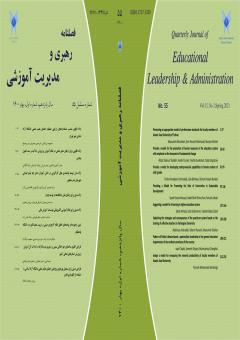Validation of an appropriate educational leadership model for blended learning (face-to-face - virtual)
Subject Areas :Pari Saraiy 1 , Sadeg Maleki Avarsin 2 , Jahanghir Yari Haj Atalou 3
1 - PhD Student, Educational Management, Department of Educational Sciences, Tabriz Branch, Islamic Azad University, Tabriz, Iran
2 -
3 - Assistant Professor, Department of Educational Sciences, Tabriz Branch, Islamic Azad University, Tabriz, Iran
Keywords: Validation, Educational Leadership Model, Blended Learning, Factor Analysis, Face-to-Face Learning, Virtual Learning.,
Abstract :
Purpose: The aim of the present study is to validate an educational leadership model suitable for blended learning (face-to-face-virtual) in elementary school.
Methods: This study is applied in terms of purpose and quantitative in terms of method using exploratory and confirmatory factor analysis. In the first stage, based on the results of previous studies and qualitative content analysis, a questionnaire consisting of 78 questions was designed. In the second stage, data related to this questionnaire were collected from 300 elementary school teachers and principals who were selected through random sampling. In order to analyze the data, exploratory factor analysis (EFA) with SPSS 16 software and confirmatory factor analysis (CFA) with AMOS 22 software were used.
Findings: The findings showed that the designed model had a good fit and all of its main components (characteristics and capabilities of educational leadership (face-to-face-virtual), outcomes of blended learning, learning environment, technological competencies for educational leadership, philosophical and epistemological system, evaluation and feedback, and organizational conditions of blended learning) were confirmed. The results showed that the designed model is able to explain 78% of the variance in educational leadership characteristics and capabilities (face-to-face-virtual), 75% of the variance in learning outcomes, 78% of the variance in learning environment, 73% of the variance in technological competencies for educational leadership, 79% of the variance in philosophical and epistemological attitudes, 73% of the variance in evaluation and feedback, and 72% of the variance in organizational conditions of blended learning.
Conclusion: These findings confirm that the presented model has the necessary validity and can be used as a framework for improving educational leadership in blended learning.
افجه، سیدعلی اکبر، خاشعی ورنامخواستی، وحید، دهقانان، حامد، مسوه مبارکه، آرتیمس . (1402). الگوی رهبری مجازی، مطالعات مدیریت بهبود و تحول، 32(107): 7-44.
ثقفی، محمودرضا. (1394). یک مدل جامع مرکب برای آموزش معماری: ترکیبی از محیطهای یادگیری حضوری و مجازی. فناوری آموزش، 9(3): 155-165.
ثقفی، محمودرضا. (1394). یک مدل جامع مرکب برای آموزش معماری: ترکیبی از محیطهای یادگیری حضوری و مجازی. فناوری آموزش، 4(2): 263-253.
رئوفی، مریم، موسوی، فرانک، منصور پاشائی، وحید، فتاحی، لیلا، رحیمی، محمدرضا، بابائی، امیرعلی، خشنور، فوزیه. (1402). واکاوی ابعاد و مولفه های رهبری کلاس درس در فضای مجازی، فصلنامه تعالی تعلیم و تربیت و آموزش، 1(3): 39-54
زارع سنجی لک، میثم، قهرمان بلارغو، حامد، پاکدامن قولنجی، عرفان، کباسی، سجاد. (1403). استراتژی های نوظهور رهبری برای محیط های یادگیری ترکیبی، سومین کنفرانس بین المللی پژوهش های مدیریت، تعلیم و تربیت در آموزش و پرورش، تهران،
غیاثی ندوشن، سعید، عباسپور، عباس، قدمی، کاوه. (1395). بررسی رابطه بین هوش معنوی با رهبری آموزشی مدیران دانشگاه علامه طباطبائی، مجله مطالعات الگوی پیشرفت اسلامی ایرانی، 4(8): 20-41.
علیجان نوده پشنگی، مجید، بهرنگی، محمدرضا، عبداللهی، بیژن، زین آبادی، حسن. (1397). مؤلفههاي اثربخشی رهبري آموزش و یادگیري کلاس درس در مدارس متوسطه. پژوهش در یادگیري آموزشگاهی و مجازي، 2(22): 80-65.
Alarifi, B. N., & Song, S. (2024). Online vs in-person learning in higher education: effects on student achievement and recommendations for leadership. Humanities and Social Sciences Communications, 11(1), 100-121.
Arar, K., Örücü, D., Gümüş, S. (2024). Educational leadership and policy studies in refugee education: a systematic review of existing research. Educational Review, 76(4), 1032-1056.
Brauckmann, S., Pashiardis, P., & Ärlestig, H. (2023). Bringing context and educational leadership together: Fostering the professional development of school principals. Professional development in education, 49(1), 4-15.
Brauckmann, S., Pashiardis, P., & Ärlestig, H. (2023). Bringing context and educational leadership together: Fostering the professional development of school principals. Professional development in education, 49(1), 4-15.
Deng, C., Gulseren, D., Isola, C., Grocutt, K., & Turner, N. (2023). Transformational leadership effectiveness: an evidence-based primer. Human Resource Development International, 26(5), 627-641.
Deng, C., Gulseren, D., Isola, C., Grocutt, K., & Turner, N. (2023). Transformational leadership effectiveness: an evidence-based primer. Human Resource Development International, 26(5), 627-641.
Eaton, L., Bridgman, T., & Cummings, S. (2024). Advancing the democratization of work: A new intellectual history of transformational leadership theory. Leadership, 20(3), 125-143.
Kezar, A. J. (Ed.). (2023). Rethinking leadership in a complex, multicultural, and global environment: New concepts and models for higher education. Taylor & Francis.
Liu, B. F., Shi, D., Lim, J. R., Islam, K., Edwards, A. L., & Seeger, M. (2022). When crises hit home: How US higher education leaders navigate values during uncertain times. Journal of Business Ethics, 179(2), 353-368.
Luong, P. A. (2022). Applying the concepts of “community” and “social interaction” from Vygotsky’s sociocultural theory of cognitive development in math teaching to develop learner’s math communication competencies. Vietnam Journal of Education, 209-215.
Mallillin, L. L. D. (2022). Adaptive theory approach in leadership: a guide to educational management system and mechanisms. European Journal of Education Studies, 9(7), 12-33.


